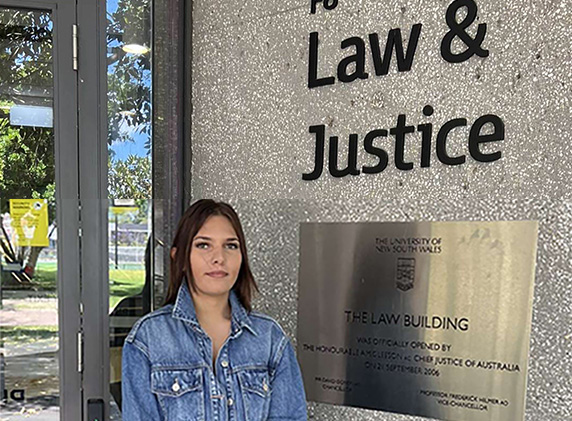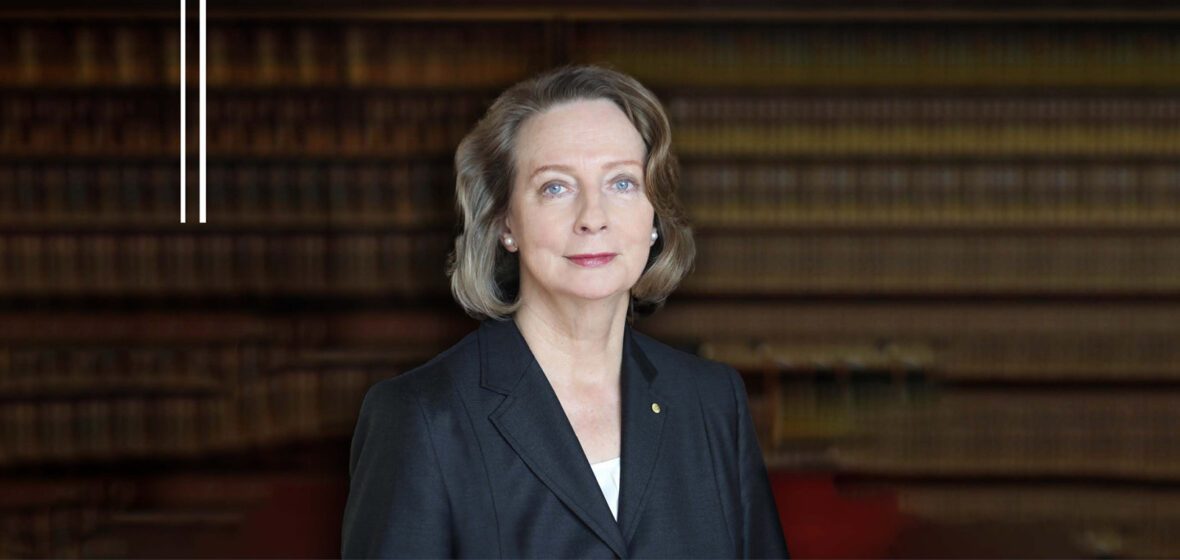Delivering the 2022 Hal Wootten Lecture at the University of New South Wales (UNSW), Chief Justice Kiefel discussed landmark cases that have “nudged the law in the right direction”. She also highlighted the overall message of the event’s founder: that every person can affect the direction of the law – and the world.
The Hon. Chief Justice Susan Kiefel AC delivered the 2022 Hal Wootten lecture on 24 November at the School of Law and Justice, UNSW. This was the 14th lecture in the series, established in 2006 and named after the founding dean, the late Emeritus Professor Hal Wootten.
Hal Wootten believed that all persons, lawyers in particular, can and should endeavour to live worthwhile lives, said Chief Justice Kiefel. “This was embodied in his ‘little nudge’ philosophy. Hal Wootten spoke of his belief that every person has opportunities to give the world a little nudge in the right direction. The cumulative effect of [all those] little nudges has a major effect on the direction the world takes,” said her Honour.
In her lecture, Kiefel discussed two landmark cases that have shaped Australian common law, tracing the development of legal principles arising from those cases and highlighting how these cases are the culmination of past judicial “nudges” in the right direction ‘and resulted in changes in socio-political thinking and executive and legislative action.’
She referred to Donoghue v Stevenson [1932], “a landmark decision in tort law that stated the principle of when and to whom a duty of care is owed and provided the foundation for the modern law of negligence.”
Her Honour also highlighted “the judgements of the High Court of Australia in Mabo (No. 2) [which] introduced the principle of native title into the Australian legal system”. In acknowledging the traditional rights of the Meriam people to their land, the court also held that native title existed for all Indigenous people.
Every person has opportunities to give the world a little nudge in the right direction. The cumulative effect of all those little nudges has a major effect on the direction the world takes.
As Kiefel noted, Hal Wootten made a critical contribution to the recognition of native title principle, and, in general, to recognition of the rights of Indigenous people. He initiated the formation of the Aboriginal Legal Service, jointly presided over the Royal Commission into Aboriginal Deaths in Custody and sat on the Native Titles Tribunal and the Australian Law Reform Commission.
On a path to ‘nudging’ the law
Legal professionals in other areas of the law have also been instrumental in “nudging the law in the right direction”. Present at the event was Wakka Wakka/Gunggari man Kevin Williams, lecturer and legal consultant, who co-founded the Indigenous Pre-Law Program at UNSW. For the past 25 years, this program has been equipping Indigenous students with the knowledge and skills to start the journey towards becoming lawyers. “It’s important for young Indigenous people to study law, to become lawyers,” Williams said.
The latest Pre-Law Program commenced on 21 November and is an intensive four- week course that acts as a stepping stone into the undergraduate law degree at UNSW. Williams, who travelled from Queensland to attend the event and meet current students in the program, introduced one of them to LSJ.
Jasmine Winter told LSJ, “I’m a descendant of the Pitjantjatjara, Warumungu tribes from my mother’s side and my father’s side is Jingili and Mudburra from the Northern Territory.”

“I was born in Tennant Creek in the Northern Territory,” said Winter.
“Looking at my community, it disheartens me to see the social injustices and the lack of input into infrastructure in the town.
“I will do everything in my power to change that outlook on my community.”
Winter sees the introduction of justice reinvestment as a critical need for her community, a redirection of money from prisons to fund and rebuild human resources and physical infrastructure in those areas that are most affected by high levels of incarceration.
Winter adds, “The pre-law program gives me the opportunity to make an impact on the law. I strongly believe that to break the patterns in the current system you must know the system. I encourage all other young Indigenous people wanting to study law”.
As Winter leaves the UNSW Law & Justice building, she pauses for a moment, hoping that she will be studying here in the years ahead. If her attendance in the pre-law course is successful she will be able to enrol in the undergraduate law degree, where she will continue to be supported through UNSW’s Nura Gili Centre for Indigenous Programs.
She passes by Hal Wootten’s quote, engraved on a wall of the building – “A law school should have and communicate to its students a concern for those on whom the law may bear harshly”.
There is no doubt that Winter embodies that concern. And her desire to bring justice to her community was the first nudge in the right direction.




